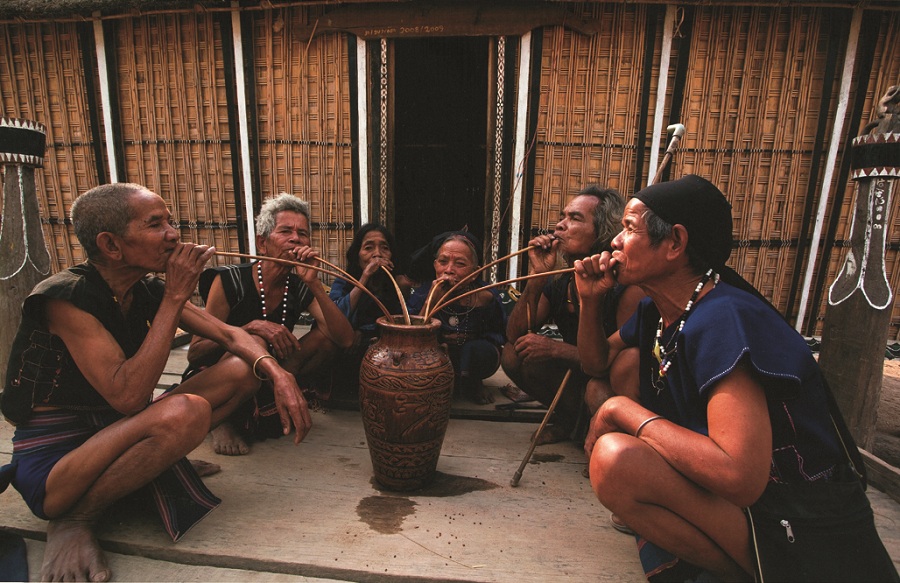
Divided into Kpa Krung, Adtham, Mthur, Ktul..., Ede ethnic group with more than 160,000 inhabitants living in the heart of Dac Lac Highlands, Khanh Hoa uses the Malayo-Polynesia language. They dwell in stilted houses with sloping roofs. Besides farming and breeding, they hunt wild animals, taming elephants and picking fruits. Their culture is original with many well-known epics.
K'PAL AND THE LIFE OF THE EDE PEOPLE
K'pal or "Sacred bench" is an essential feature of all festivities and ceremonies of the Ede, an ethnic group in Central VietNam. It is reserved for the elderly of the village, guests and musicians, and females are strictly forbidden from sleeping on it. The bench is carefully constructed in strict conformity with age-old rules. It is usually 13 m long, 0.7 m wide and about 21 to 22 cm thick, and the whole process of making it must be completed within seven days. To make a k'pal, the head of the family first makes an offering to the god Giang Wah Yang, protector of all ceremonial objects and cultural symbols. Offering preparations includes a fine pot of distilled rice wine, kept for at least one year at a pure place believed to be under the close watch of the gods of the forest and river. In addition, there are the tools to be used in the making of the k'pal, like axes and hammers. Early in the dry season, young men go deep into the jungle in search of suitable wood from a tree that meets several conditions, including having no creepers, no birds' nests or bees. The Ede people believes that such trees are haunted by spirits and, therefore, objects made from them are not likely to lead to a peaceful and prosperous life. Once the tree has been chosen, an axe without a handle is thrown into its trunk and left there overnight. If the axe does not fall down, the practice is repeated twice more before cutting the tree down to make the k'pal. The family head then summons seven workers to cut the tree down. Once the k'pal is completed - within seven days - rice wine is offered and a goat-sacrifice ceremony held for the forest god. The goat's meat is distributed to the workers. Later, the k'pal is taken home in a ceremony during which the entire family dresses in traditional Ede costumes and plays the Ki Path and Ding Tat or other traditional musical instruments. The family head and the local wizard lead the procession. The family head dances the ceremonial Adring dance with a shield to show the family's pride and martial arts. Then, amid the reciting of poems, offerings are made to the gods and the k'pal is carefully brought inside the house and tied to the wall. For one whole day, no one is allowed to pass the place where the k'pal is kept. Throughout the night, the family head and other male members of the house must dance the ceremonial dances three times, offering the gods seven pots of wine and a buffalo. (VNS)